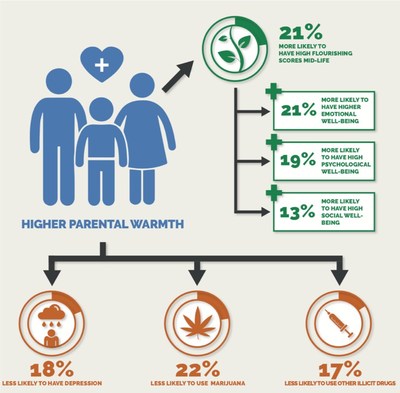A childhood with loving parents can lead to life as an adult with flourishing in multiple domains, a new study from the Human Flourishing Program at Harvard University’s Institute for Quantitative Social Sciences has found.
CAMBRIDGE, Mass., Jan. 3, 2019 /PRNewswire/ -- A childhood with loving parents can lead to life as an adult with flourishing in multiple domains, a new study from the Human Flourishing Program at Harvard University's Institute for Quantitative Social Sciences has found.

The study, Parental Warmth and Flourishing in Mid-Life, marks an important advance in the study of flourishing. The paper reveals that people's childhood relationship with their parents has a positive influence on their emotional, psychological, and social well-being in adulthood.
While prior research on parental warmth has analyzed its influence on individual aspects of well-being, considered separately, the Harvard study's new contribution to the literature is its holistic examination of parental warmth in relation to multiple measures of well-being.
"Much of the past research on childhood antecedents of health has focused on identifying risk factors for illness such as parental neglect and parental abuse. In contrast, positive factors that help promote health and well-being later in life are relatively understudied," said lead author Ying Chen.
In the study, a moderate increase in parental warmth was linked to a variety of positive outcomes in mid-life (see the infographic), including 21% greater likelihood of high levels of flourishing, a 18% lower risk of depression and a 17% lower risk of illicit drug use.
The study employed rigorous research methods and found that the association between flourishing and parental warmth to be strong even when other childhood factors are taken into consideration, such as socioeconomic status or familial religiousness.
The findings suggest that implementing parenting programs as part of public health policy could lead to a substantial positive effect for population health and well-being. "The progress to date on such initiatives remains relatively slow," commented Chen.
The study's conclusions, by documenting that parental warmth is linked to flourishing across multiple domains of well-being in mid-life, supports the need for further efforts to foster better parenting.
Parental Warmth and Flourishing in Mid-Life, authored by Ying Chen, Laura Kubzansky, and Tyler VanderWeele, can be read in the January 2019 edition of Social Science and Medicine (Volume 220). For more information about the study and the Human Flourishing Program at Harvard University, please visit https://hfh.fas.harvard.edu/.
![]() View original content to download multimedia:http://www.prnewswire.com/news-releases/new-harvard-study-finds-that-parental-warmth-in-childhood-is-associated-with-subsequent-flourishing-across-multiple-domains-300771562.html
View original content to download multimedia:http://www.prnewswire.com/news-releases/new-harvard-study-finds-that-parental-warmth-in-childhood-is-associated-with-subsequent-flourishing-across-multiple-domains-300771562.html
SOURCE Harvard University, Human Flourishing Program




